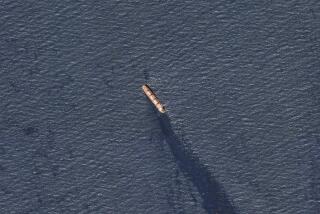The scourge of Somalia
Jean and Scott Adam of Marina del Rey lived a life many would envy, until it was cut short Tuesday by a band of Somali pirates. On their yacht, Quest, they had spent most of the last decade sailing to exotic locales and were on a trip from Thailand to the Mediterranean with another couple, Phyllis Macay and Robert Riggle of Seattle, when their boat was intercepted off the coast of Oman. All four were shot to death Tuesday by their captors after negotiations with U.S. naval officials for their release apparently broke down.
Pirates plying the seas off Somalia have been a scourge of international shipping for years, but this week’s slayings mark the deadliest incident yet involving Americans. In response, Secretary of State Hillary Rodham Clinton called on foreign governments to contribute more toward the African Union peacekeeping force in Somalia. Solutions to that country’s piracy and governance problems are elusive, but the peacekeeping effort backed by Clinton isn’t working, and U.S. policy toward Somalia could stand another look.
Tempting as it is to call for more naval involvement, it’s clear that a purely military approach won’t cut it. To avoid the U.S. 5th Fleet and other international warships plying the waters near Somalia, pirates are simply ranging farther afield; the seas between Somalia and India are too vast to be effectively patrolled. Meanwhile, every effort by the United States to intervene in Somali affairs since 1993, when the Clinton administration’s attempts to subdue Mogadishu’s warlords ended in the catastrophe chronicled in the film “Black Hawk Down,” has backfired spectacularly.
The latest failed initiative is the so-called Transitional Federal Government, a United Nations fiction that controls a few square blocks in Mogadishu. The United States has invested millions of dollars arming a peacekeeping force to protect the TFG, which has little public support and is widely viewed by Somalis as an invading foreign force. Bronwyn E. Bruton, an Africa scholar with the Council on Foreign Relations, argues convincingly that the TFG is not only failing to spread democracy and the rule of law, it is actually strengthening radical Islamist movements by prompting quarrelsome extremist groups to unite against a common enemy.
Bronwyn’s proposed solution is “constructive disengagement,” in which the U.S. stops backing a failed U.N. experiment and vows to engage with any government that emerges, including an Islamist one, as long as it renounces international terrorism and agrees not to interfere with humanitarian relief workers. A government with a measure of legitimacy is far likelier to stabilize Somalia than the current puppet regime, even if it’s not as secular as we’d like.
More to Read
A cure for the common opinion
Get thought-provoking perspectives with our weekly newsletter.
You may occasionally receive promotional content from the Los Angeles Times.






